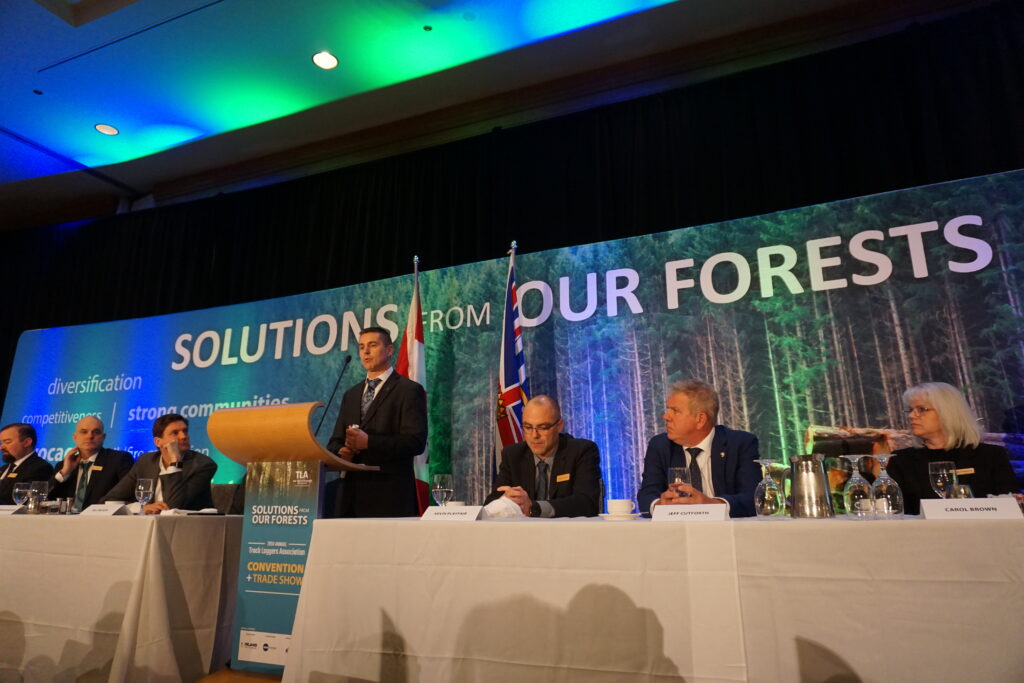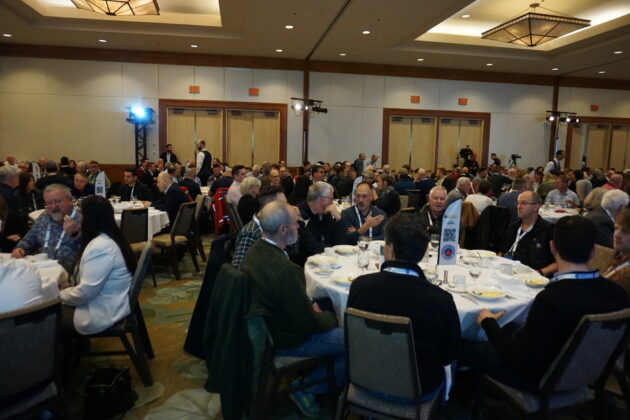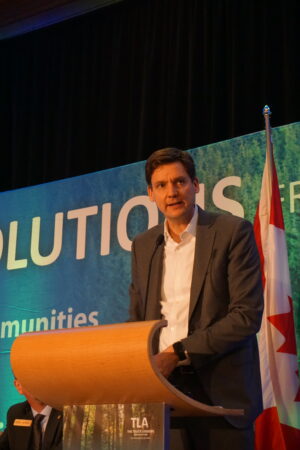
Features
Industry News
News
Navigating challenges: TLA Convention addresses sector’s struggles
B.C. premier outlines strategies for a resilient future, as industry voices concerns over fiber supply shortage and market uncertainties
January 29, 2024 By Jennifer Ellson
 Tracey Russell (standing), vice-president of Inland Truck and Equipment, conveyed the industry’s sentiments to B.C. Premier David Eby (seated third from left) at the 79th TLA Convention in Vancouver, B.C. Photo: Annex Business Media
Tracey Russell (standing), vice-president of Inland Truck and Equipment, conveyed the industry’s sentiments to B.C. Premier David Eby (seated third from left) at the 79th TLA Convention in Vancouver, B.C. Photo: Annex Business Media At the 79th Truck Loggers Association (TLA) Convention, attendees emphasized key challenges faced by the forestry sector in British Columbia. These include a shortage in fiber supply, a global decline in prices for wood products, and uncertainties surrounding the province’s policies on old-growth and biodiversity protection. The message to government officials was clear: urgent attention is needed to address these issues.
Held in Vancouver from Jan. 17-19, Tracey Russell, vice-president of Inland Truck and Equipment, conveyed the industry’s sentiments on Day 2, stating, “we’re in dire straits right now,” as he introduced B.C. Premier David Eby on stage, seizing the opportunity to communicate the sector’s concerns directly to the premier. Russell shared real-world struggles, highlighting job losses and the dire situation the industry currently faces.
Russell underlined the disparity between the industry’s sentiments in the room and the government’s actions, emphasizing the downsizing impact on the sector. He pointed out that the reduction in harvesting rights is a significant setback, likening the industry’s current financial situation to the challenges faced during the 2008 financial crisis.
“There is a disconnect between how people in this room feel and how the government is downgrading the industry, making it smaller,” Russell said.
Advertisement

It was a full house at the 79th Truck Loggers Association convention held in Vancouver from January 17 to 19, 2024. Photo: Annex Business Media.
Eby addressed the full house, expressing optimism about the future of forestry.
“It is not part of the plan to reduce your industry,” Eby stated. “There is no question in my mind that forestry is the answer to so many of B.C.’s challenges,” he enthused.
“The future of forestry is a strong one. Currently it’s a challenging one and I want you to know that I know that,” he added.
Eby reiterated his government’s committment, stressing the importance of long-term agreements between First Nations and companies on old-growth protection, logging and forest landscape planning; retooling mills with a $150 million manufacturing aid fund that has so far created 355 jobs and saved more than 700 jobs; and exploring new overseas markets – most recently in Japan – to mitigate the impact of the U.S.-Canada softwood lumber dispute.
The premier announced the appointment of Andrew Mercier as the new sustainable forestry innovation minister whose role is to troubleshoot and bridge gaps between the trees that are available, and those with access to the tenure and fiber supply across operations in the province.
“His job is to free up the trees so there can be predictability .. I’m dedicated to have the minister work with you to get results,” Eby said.
Despite these measures, concerns were raised during the Q&A session about the instability caused by long-term forest landscape planning, biodiversity issues, and old-growth policies.

B.C. Premier David Eby at the 2024 TLA convention. Photo: Annex Business Media.
The industry appealed to Eby for assistance. Questions arose about changing the perception of tree cutting, to which Eby expressed openness to new ideas and aid to help the sector transition through difficult times.
“How do we change the perception?” Russell asked the room. “We have to get through to the community that it’s okay to cut down trees … that’s the challenge to Premier Eby here … where is the government in being a proponent of the industry?” Russell asked Eby.
With “solutions from our forests” as this year’s theme, the industry acknowledged the premier’s efforts on some fronts during the Q&A session. However, the industry is still cautiously hopeful for additional support to address ongoing challenges in this crucial sector, said Russell.
“We’re reliant on the forests. The only way that our message will be heard – the only way to get the facts to the government – is through the associations such as TLA,” he added.
Eby said he is ready to listen and take action, but noted the annual allowable cut would probably never return to historical levels similar to 10 years ago.
My success in politics has been listening and getting things done,” he said. “I rely on you – the industry and the association – to tell me what’s going on.”
Print this page